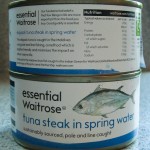There has been a lot of publicity about the imminent demise of tuna in the last year. Whilst most of the attention has been on Bluefin tuna it opens a whole can of worms with regard to the tuna usually bought in UK supermarkets.
So, what are the different types of tuna and which ones do we commonly eat (fortunately Greenpeace has a helpful guide). There are 23 types of tuna, and, according to Greenpeace, 22 of them are vulnerable. The main market for the aforementioned Bluefin is Japan which takes 90% of the catch. In the UK we consume some Yellowfin Tuna (sold as steaks at the fresh fish counters and in some tins – to be avoided if it is not caught by sustainable methods) along with Albercore and Skipjack (also in tins). By far the most common is Skipjack which is also the tuna most likely to be found in ready meals and pre-prepared sandwiches. The UK is the second biggest consumer of tinned tuna (after the US) and so I will concentrate on this source.
Following on from the publicity, there have been declarations of never eating tuna again, no more tuna sandwiches, but is this entirely necessary. According to the Ecologist, it probably is, according to Greenpeace, on whose survey the Ecologist article was largely based, tinned tuna need not disappear from our collective menu.
So, just what is the problem with tinned tuna from a sustainability point of view (ignoring the potential problem of mercury in fish)? A lot of tuna is caught in large nets or by lines up to 100km long. We all remember the adverse publicity that came from pictures of dolphins caught in the net and the advent of ‘dolphin-friendly’ labels on tins of tuna. However, dolphins are not the only bycatch of the tuna industry, other marine species that are caught include several species of turtle, sharks, rays and young tuna. These together constitute about 10% of the catch with some fishing methods, which is where most of the problem with eating Skipjack tuna lies. Much of the tuna fish destined for the tinned market is caught using large nets (purse seines) with floats on to encourage the fish to gather together which is where this bycatch is at its worst.
What can we, as consumers, do about this? There are more sustainable methods of fishing, such as pole and line, which target the adult fish and therefore avoid much of the bycatch. These also tend to be smaller outfits that are more likely to support local projects and which will look after local fish stocks, being unable to move to other areas once a resource has been used up. Therefore, always look at the label to see what kind of tuna it is – if it is yellowfin, is there a skipjack alternative (these are more numerous than yellowfin)?
 Next look at the method of fishing. Waitrose, have recently introduced an own label tinned tuna which is clearly marked as being caught by pole and line methods. If they don’t state on the tin, assume the worst – with the recent publicity it is in their interests to tell you if it is a sustainable method. John West and Princes are the two largest brands in the UK, they were bottom in the recent Greenpeace survey and do not seem too interested in changing their ways. I checked John West, in most cases they do not state either the type of tuna or the method of catching it. On the contrary, Sainsbury’s who came top in the original survey have gone 100% own brand pole and line and introduced a branded pole and line range. M&S are also moving to 100% pole and line for their own brands and are extending it to the tuna used in their sandwiches, salads and ready meals. The other supermarkets seem a little less responsive, maybe they will catch up.
Next look at the method of fishing. Waitrose, have recently introduced an own label tinned tuna which is clearly marked as being caught by pole and line methods. If they don’t state on the tin, assume the worst – with the recent publicity it is in their interests to tell you if it is a sustainable method. John West and Princes are the two largest brands in the UK, they were bottom in the recent Greenpeace survey and do not seem too interested in changing their ways. I checked John West, in most cases they do not state either the type of tuna or the method of catching it. On the contrary, Sainsbury’s who came top in the original survey have gone 100% own brand pole and line and introduced a branded pole and line range. M&S are also moving to 100% pole and line for their own brands and are extending it to the tuna used in their sandwiches, salads and ready meals. The other supermarkets seem a little less responsive, maybe they will catch up.
I have recently written to Waitrose, my supermarket of choice (as I only have Tesco and Aldi as local alternatives) asking them to stop stocking other brands which do not conform to their own standards (ie John West), I doubt that they will do this, but, if sales of this brand were to drop relative to their own, more ethically produced brand, then maybe they will think again.
So, I don’t have to stop buying my tinned tuna, I just have to be a little discerning and boycott the larger brands in the hope that declining public opinion and sales will give them a reason to look at their social responsibility.